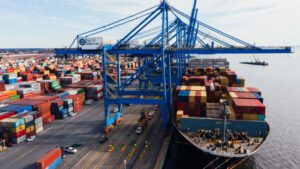
Pollution threatens Nigeria’s $24trn Blue Economy — Prof Opuala-Charles
By Barth Ndubuwah, Port Harcourt
The President of Garden City Premier Business School and Special Guest of Honour at the 2025 Correspondents’ Chapel Week, Prof Silva Opuala-Charles, has identified pollution as the biggest obstacle to the development of the blue economy in the Niger Delta.
He stated that “strategy without structure is futile,” pointing out Nigeria’s lack of readiness to capitalise on the vast potential of its marine resources.
Speaking at the event in Port Harcourt, Prof Opuala-Charles underscored that Rivers State, with its 112km coastline, deserves more attention in national planning and resource allocation.
He further argued that the full benefits of the blue economy can only be realised through proper fiscal federalism, ensuring that economic growth results in higher per capita income for citizens.
Prof Opuala-Charles expressed concern about the widespread pollution in the Niger Delta’s seas, a consequence of decades of oil exploration and exploitation, which has decimated marine life.
He referenced a United Nations estimate which suggests that $12 billion is needed to clean up the region, which has experienced around 13 million barrels of oil spills since 1958.
He revealed that Nigeria’s blue economy is valued at over $24 trillion, contributing to a global market worth approximately $115 trillion.
The blue economy, he explained, covers maritime activities, fisheries, aquaculture, tourism, and more. He further stressed that the revitalisation of historic coastal city-states such as Bonny, Nembe, and Buguma is vital to unlocking this economic potential.
Prof Opuala-Charles commended the Nigeria Union of Journalists (NUJ) Correspondents’ Chapel for selecting the theme, “Blue Economy: Starting Steps for Rivers State,” and officially declared the Chapel Week open.
In his remarks, the Chairman of the occasion, Dr Chamberlain Peterside, represented by Atonye Wilcox, stated that the blue economy offers greater business potential than the oil and gas sector.
He proposed the redevelopment of old Port Harcourt township and its reconnection to the sea, emphasising that environmental concerns must be addressed first.
“Economy and environment go hand in hand. You cannot discuss one in isolation,” he said, praising journalists for bringing attention to the issue.
Delivering the keynote address, Mr Ubong Essien, Dean of the School of Eloquence and Founder of the Blue Economy Academy, described Nigeria as a “sea-blind nation” despite its 853km coastline and abundant maritime resources.
He lamented the country’s failure to shift focus towards the blue economy, especially amid declining oil revenues and rising youth unemployment.
“Rivers State should be Nigeria’s blue economy headquarters, home to ports, pipelines, mangroves, marine technology, fisheries, and floating opportunities,” Essien declared, emphasising the role of journalists as “saviours of national awareness.”
Also speaking, Chairperson of the National Association of Women Journalists (NAWOJ) in Rivers State, Comrade Susan Serekananwikana, praised the Correspondents’ Chapel for consistently organising the annual event and applauded the leadership of the organising committee.
The Chairman of the Organising Committee, Mr Ignatius Chukwu, expressed gratitude to all participants and encouraged journalists to monetise their talents and explore untapped opportunities in media and communication.
The programme also featured an interactive Q&A session, which saw active engagement from participants across the media and academic sectors.




